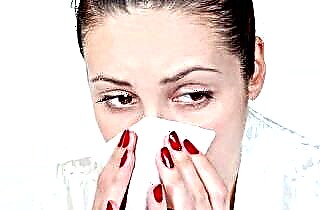Itching is a burning and tingling sensation triggered by exposure to exogenous and endogenous factors. Discomfort occurs due to irritation of the nerve endings in the skin. Undesirable manifestations can be triggered by stress, allergies, parasites, mechanical friction and skin diseases. What to do if your nose itches?
 Before starting treatment, it is necessary to identify and eliminate the causes of itching. To do this, it is advisable to seek help from a therapist or dermatologist who can diagnose the disease based on the condition of the skin and accompanying symptoms. To eliminate discomfort, the patient will be prescribed drugs of symptomatic and etiotropic action.
Before starting treatment, it is necessary to identify and eliminate the causes of itching. To do this, it is advisable to seek help from a therapist or dermatologist who can diagnose the disease based on the condition of the skin and accompanying symptoms. To eliminate discomfort, the patient will be prescribed drugs of symptomatic and etiotropic action.
Causes
The causes of discomfort in the nasal area are often rooted in the development of allergic reactions. Skin contact with allergens leads to soft tissue irritation and, consequently, itching and burning. Also, an unpleasant symptom may appear due to lack of hygiene or insufficient humidification of the air in the room. In most cases, the causes of an itchy nose outside are:
Skin diseases
Why does the nose itch on the outside? Parasitic, allergic and infectious skin diseases are the most likely causes of irritation on the wings of the nose. Each pathology has its own distinctive features, the finding of which allows you to determine the causative agent of the disease and, accordingly, prescribe an adequate treatment regimen:
- sycosis of the nose - recurrent inflammation of the hair follicles in the epidermis, provoked by staphylococci; occurs against the background of bacterial rhinitis, endocrine diseases, microtraumas, neurological disorders;
- eczema of the nose is a non-contagious disease characterized by inflammation of the skin on the wings of the nose; accompanied by severe itching, burning and painful sensations on palpation;
- scabies - a contagious skin disease caused by the scabies mite; the development of pathology is accompanied by itching, papulovesicular rash, redness on the skin, abscesses;
- dermatosis is a separate group of skin pathologies that arise against the background of exposure to pathogenic microflora or genetic predisposition; the nose may itch due to the development of atopic dermatitis, impetigo, urticaria, psoriasis, etc.
If the wings of the nose and the skin in the area of the nasolabial folds itch constantly, in 8 out of 10 cases this indicates the development of dermatosis.
Allergy
One of the most likely causes of itching is an allergic reaction. Contact with allergens inevitably leads to inflammation of the epidermis and, as a result, uncomfortable sensations. Hygienic and decorative cosmetics, plant pollen, household chemicals, animal hair, medicines, etc. can cause undesirable reactions in the skin.

As a rule, with the development of allergies, not only the nose is very itchy, but also the mucous membrane of the nasopharynx. In connection, the disease is often accompanied by:
- lacrimation;
- runny nose;
- sneezing;
- nasal congestion;
- redness of the conjunctiva of the eyes.
The true causes of hay fever lie in the inadequate response of the immune system to the action of allergens. Their penetration into the body leads to over-activation of mast cells (mast cells), which contain histamine. The release of an inflammatory mediator from mast cells leads to inflammation and swelling of the soft tissues.
It is important to understand that with allergies, severe swelling of the mucous membranes in the respiratory tract occurs, therefore, untimely elimination of inflammation can lead to respiratory failure.
Exogenous factors
Why does the nose itch? Severe itching, burning and inflammation of the skin occurs due to the negative effects of external factors. Very often, itching around the nose is provoked by non-infectious factors:
- inhalation of dry air;
- lack of hygiene;
- thermal and chemical burns;
- unfavorable ecology.
Skin irritation in the nostril area usually occurs during the winter when the central heating is turned on. Inhalation of dry air, the humidity of which does not exceed 50%, leads to dehydration of the epidermis and the formation of microcracks on its surface. In addition, the causes of itching can lie in the adverse effects of solar radiation in the summer. Sunbathing abuse is fraught with the destruction of epithelial cells and, as a result, the occurrence of discomfort.
Insect bites
Insect bites are one of the causes of inflammation and itching in the skin. Many stinging arthropods, in particular hornets, bees and wasps, secrete poisons during a bite, which provoke an allergic reaction in soft tissues. In rare cases, allergy leads to severe complications and anaphylactic shock, which is a threat to human life.
If the nose itches on the outside, this may indicate a bite of blood-sucking parasites, which include:
- mosquitoes;
- bedbugs;
- fleas;
- ticks;
- lice.
Parasites are carriers of infections that can cause serious diseases in humans: encephalitis, brucellosis, anthrax, etc. As a rule, they do not emit strong poisons that provoke an acute allergic reaction. Often, there is a slight inflammation at the site of the bite, which is accompanied by itching. Scratching the affected area can cause further tissue damage. To prevent negative consequences, the bite site must be treated with an antiseptic cream or spray.
Therapy methods
 Methods for treating inflammation and itching in the nasal area directly depend on the cause of the problem. It should be understood that the irrational use of drugs can lead to a deterioration in well-being and dire consequences. Before using drugs, it is necessary to identify and eliminate provoking factors, otherwise relapses of inflammation may occur.
Methods for treating inflammation and itching in the nasal area directly depend on the cause of the problem. It should be understood that the irrational use of drugs can lead to a deterioration in well-being and dire consequences. Before using drugs, it is necessary to identify and eliminate provoking factors, otherwise relapses of inflammation may occur.
Allergy treatment
If the tip of the nose itches due to the development of an allergic reaction, it will be possible to eliminate the undesirable manifestations of the disease with the help of anti-inflammatory and anti-allergic drugs. Usually, the treatment regimen for pollinosis includes:
- antihistamines ("Cetrin", "Zyrtec", "Erius") - reduce the sensitivity of histamine receptors and prevent the release of inflammatory mediators from mast cells, thereby eliminating swelling, itching and inflammation;
- glucocorticosteroid ointments (Lorinden, Advantan, Afloderm) - eliminate the manifestations of allergic dermatitis and accelerate the regeneration of the skin.
Do not use glucocorticosteroid ointments to prevent allergic dermatitis.
Abuse of any hormonal drugs is fraught with disruption of metabolic processes in the epidermis and a decrease in tissue reactivity. A good alternative to glucocorticosteroid drugs will be anti-inflammatory ointments based on panthenol. They quickly eliminate itching and promote tissue epithelialization, thereby restoring the integrity of the skin.
Treatment of dermatitis and eczema
Dermatitis is a collective term for skin diseases that are allergic or infectious in nature. Therefore, before using any medications and ointments, it is necessary to consult a dermatologist. You can eliminate the itching that occurs against the background of eczema or atopic dermatitis with the following medications:
- non-hormonal ointments ("Tsinocap", "Eplan", "Gistan") - eliminate allergic manifestations (burning, itching, inflammation, redness, edema) and promote tissue regeneration;
- corticosteroids ("Prednisolone", "Dexamethasone", "Triamcinolone") - accelerate the regression of inflammatory processes and eliminate the manifestations of allergies;
- antiseptic creams ("Tsindol", "Naftoderm", "Desitin") - destroy pathogenic microbes, fungi and viruses, thereby accelerating the healing process of the skin;
- immunosuppressants ("Mielosan", "Cyclophosphamide", "Chlorbutin") - suppress the activity of the immune system, which prevents the development of allergic reactions.
The complex treatment of dermatitis often includes vitamin-mineral complexes and drugs that accelerate the process of cleansing tissues from toxins. This helps to hyposensitize the body and reduce the likelihood of recurrence of allergies.
Treating insect bites
 When bitten, blood-sucking parasites inject specific enzymes under the skin, which subsequently cause an allergic reaction. To prevent unwanted manifestations, bite sites need to be treated with special sprays, ointments and creams. Allergy symptoms can be alleviated with the following medications:
When bitten, blood-sucking parasites inject specific enzymes under the skin, which subsequently cause an allergic reaction. To prevent unwanted manifestations, bite sites need to be treated with special sprays, ointments and creams. Allergy symptoms can be alleviated with the following medications:
- "Nezulin";
- "Rescuer";
- "Psylo-balm";
- Soventol;
- Elidel.
Some of the drugs contain propylene glycol, which can adversely affect the health of children under 12 and pregnant women.
Rescuer does not contain antibiotics or hormonal supplements, so it can be applied to the skin to prevent bites from mosquitoes, midges and other blood-sucking parasites.
Conclusion
Itching in the nose is a symptom that occurs due to irritation of the nerve endings in the superficial layers of the epidermis. Infection, allergies, adverse environmental conditions, etc. can cause unwanted reactions. In all cases, the principles of treatment will be very different. Therefore, prolonged itching and discomfort in the nasal area is a good reason for seeking help from a therapist or dermatologist.



